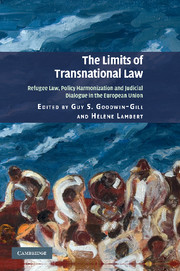 The Limits of Transnational Law
The Limits of Transnational Law Book contents
- Frontmatter
- Contents
- Notes on contributors and editors
- Acknowledgements
- Abbreviations
- 1 Transnational law, judges and refugees in the European Union
- 2 Where is the reference? On the limited role of transnational dialogue in Belgian refugee law
- 3 Transnational refugee law in the French courts: deliberate or compelled change in judicial attitudes?
- 4 The use of foreign asylum jurisprudence in the German administrative courts
- 5 The solipsistic legal monologue of Italian authorities
- 6 ‘Thou shalt not judge’ … Spanish judicial decision-making in asylum and the role of judges in interpreting the law
- 7 The British judiciary and the search for reciprocal relations with its continental partners
- 8 Speaking across borders: the limits and potential transnational dialogue on refugee law in Ireland
- 9 The absence of foreign law in Danish asylum decisions – quasi-judicial monologue with domestic policy focus?
- 10 Foreign law in Swedish judicial decision-making: playing a limited role in refugee law cases
- 11 The search for the one, true meaning …
- Bibliography
- Index
9 - The absence of foreign law in Danish asylum decisions – quasi-judicial monologue with domestic policy focus?
Published online by Cambridge University Press: 06 July 2010
- Frontmatter
- Contents
- Notes on contributors and editors
- Acknowledgements
- Abbreviations
- 1 Transnational law, judges and refugees in the European Union
- 2 Where is the reference? On the limited role of transnational dialogue in Belgian refugee law
- 3 Transnational refugee law in the French courts: deliberate or compelled change in judicial attitudes?
- 4 The use of foreign asylum jurisprudence in the German administrative courts
- 5 The solipsistic legal monologue of Italian authorities
- 6 ‘Thou shalt not judge’ … Spanish judicial decision-making in asylum and the role of judges in interpreting the law
- 7 The British judiciary and the search for reciprocal relations with its continental partners
- 8 Speaking across borders: the limits and potential transnational dialogue on refugee law in Ireland
- 9 The absence of foreign law in Danish asylum decisions – quasi-judicial monologue with domestic policy focus?
- 10 Foreign law in Swedish judicial decision-making: playing a limited role in refugee law cases
- 11 The search for the one, true meaning …
- Bibliography
- Index
Summary
Introduction
As it will appear from this chapter, decisions on asylum applications in Denmark are generally made without references to foreign law. The absence of such references is probably not merely an expression of the lack of influence of foreign law on Danish asylum practices, but can be seen as an indication of a more general tendency towards the exclusion of transnational law, whether foreign or international, as a source of asylum law. Thus, while the central international legal instruments concerning refugee protection – in particular the UN Refugee Convention, the UN Convention Against Torture and the European Convention on Human Rights – are binding on Denmark and even formally incorporated into Danish law, the past few years have seen quite significant examples of asylum applications being turned down on the basis of interpretation and application of these treaties that could be, and indeed have been, considered questionable.
The analysis here is mainly based on publicly accessible decisions of the Danish Refugee Appeals Board, a quasi-judicial body with specialized competence to review negative asylum decisions. Since the Board is in practice the only body reviewing asylum decisions in substance, judicial case law from the ordinary courts cannot add anything to the picture in this regard. The decisions of the Danish Immigration Service, examining asylum applications in the first instance, are not accessible, but there is no reason to believe that the first instance administrative practices would disclose deviation from the precedents of the Refugee Appeals Board.
- Type
- Chapter
- Information
- The Limits of Transnational LawRefugee Law, Policy Harmonization and Judicial Dialogue in the European Union, pp. 170 - 185Publisher: Cambridge University PressPrint publication year: 2010
